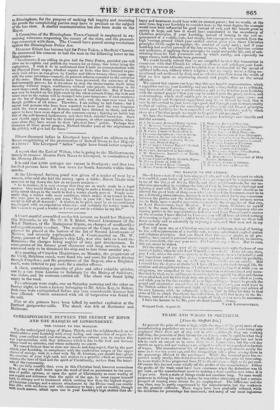At present the price of corn is high, while the
wages or lite great mass of our manufitcturing population are very low—in some ditriot a the hands being only employed three days out of six, and in otlne.s, although they arc working full time, the proceeds of their labour for nix days is mentely equal to what they received a few years ago for three. In shedield tide depression has nut been fdt to such an extent as in some distr: •ts 1:: Lai:co-:hire; but the evil day crawls on apace, and our workett: n are id•liged to solo it to a gradual reduction of wages. The manufactarers' list of prices for tlitir goods remain nearly the same as it was tom years ago, and the competition tak:e: place ;inning them in the percentage allowed to the purchasers. While the nominal price has re- mained nearly steady, this deduction from their profits has gone on increasing. In some trades it has progressed from 15 to 25, and even as high as 75 per cent. Of course this has not come wholly off the profits of the manuracturer. Either the profits of the trade must have been enormous when the deduction was 15 per cent., or the manufacturer must be making a dead sacrifice now When it is 75 per cent. Such a state of things could nut continue long. No man would persevere in risking his capital, unless lie was either obtaining or had a certain prospect of reaping sonic return for its employment. The difference and the hiss, then, may be partly experienced by the manufacturer, but the workmen are the greatest sufferers. Their wages have been gradually reduced, while the deduction for percentage has increased ; and many of our most ingenious mechanics are now only getting Is. 8d. for the same article they could formerly dispose of for 3s. 6d., while their time, at this reduced rate, is not nearly fully employed, and the price of corn and all other provisions continues as high as during the time of good wages, and the amount of pressure of their taxation has gone on increasing. This steady diminution of the rate of wages proves that bad trade has not been the result of a more casual circumstance, such as the failure of the cotton crop in America, or the unfixed state of our monetary affeirs, but that it has hued its origin in some deoper-seated and inure widely- extmiding cause. it is lint so muell bad trade, as a falling-off of triele, that ought to alarm us. New mi•kets are constantly opening up in every quarter of the globe, our old customers have not received a repletion of our ma titithetures, yet we do not find the demand fir our goods increase. Our workmen are as badly off as they can he, in the midst of three fresh currents into which they have been taught to believe that their ingenuity would he turned, and the prospects continue as dark and lowering as ever. All the sophistry of the landlords and their hireling press cannot get rid of these melancholy facts, and no one who examines the subject lint himself can long he in doubt as to their cause. They are all traceable io a direct, un- swerving line to the influence of the Corn-laws, and the only remedy for them is to be found in their speedy and total repeal. Were it not that we were well aware that prcj eiliee, where interest is concerned, so hoodwinke its victims, we might well wonder that any man who has the prosperhy and success of his country at heart, should for a single moment stand in the way of a repeal of the n-laws, seeing that they only slightly benefit one small class, while they are the cause of the utmost misery and destitution to all others; that under their it duence our trade and commerce are falling on' in every quarter of the globe : that foreigners are able to purchase OUP raw material, manufacture it, comp m with and undersell us in every market ; and that the real source of Englimt's wealth, her urea and artisans, are in a state of gradual and steady tieray.



























 Previous page
Previous page